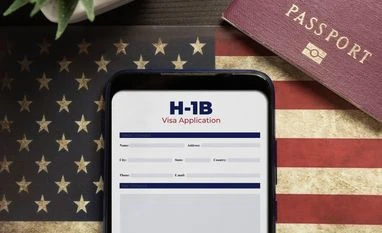US H-1B visa sponsorship declines in 2024: Experts decode key factors
Amazon, which remains the largest sponsor of H-1B visas, saw approvals drop to just over 7,000 in 2024, compared to more than 11,000 in 2023
)
The fee for H-1B registration, presently set at $10, is set to rise to $215. Photo: Shutterstock
Listen to This Article
The H-1B visa offers a route for international graduates and skilled workers to remain in the US, often serving as a critical bridge to employment and residency. However, data from the United States Citizenship and Immigration Services (USCIS) reveals a decline in H-1B visa approvals during the fiscal year 2024, with top companies sponsoring fewer applicants than in previous years.
Amazon, which remains the largest sponsor of H-1B visas, saw approvals drop to just over 7,000 in 2024, compared to more than 11,000 in 2023. Indian IT giants Infosys and Tata Consultancy Services (TCS) also reported fewer approvals. Infosys declined from over 7,300 to around 5,900, while TCS saw a reduction of roughly 1,600 approvals.
In contrast, Meta recorded an increase of about 400 approvals, likely tied to its growing investments in virtual and augmented reality technologies.
Why is the number falling?
Ajay Sharma, founder of Abhinav Immigration Services, connects the drop to shifts in the global economy and workforce needs. “The only reason I can think of is that the global recession and AI are impacting the business models of all major players. They do not need to hire for redundant positions or for positions in divisions that are losing business due to the recession,” he says.
Piyush Gupta, vice president for India and the Middle East at CanAm Enterprises, believes the decline stems from multiple factors. “While the recent drop in H-1B sponsorships by leading US employers may initially appear to be a result of tech layoffs or employee rationalisation, a closer look reveals a more complex picture. Over the past several years, we’ve observed a consistent decrease in companies offering H-1B sponsorships to foreign students,” he explains.
Also Read
Gupta adds that the unpredictability of the H-1B lottery system is another deterrent. “The lottery nature of the H-1B visa process introduces uncertainty that many businesses are increasingly reluctant to navigate. This has led to a reduction in internship opportunities for foreign students, even those at top-tier US institutions. As a result, high-net-worth individuals and ultra-high-net-worth individuals are turning to alternatives like the EB-5 programme, which allows families to invest in the US economy and secure a more certain future for their children studying or graduating in the US,” Gupta says.
According to Varun Singh, managing director at XIPHIAS Immigration, recent regulatory changes have added to the challenges. “Regulatory scrutiny on the H-1B programme has increased in recent years. Policymakers in the US have consistently prioritised American workers, which has resulted in stricter requirements and compliance checks for visa applications,” he says.
Singh also points to the rising costs of applying for H-1B visas as a contributing factor. “The USCIS increased the application fee, which might have dissuaded smaller companies or those unsure of approval outcomes from participating in the process. Even for larger firms, the unpredictability of the lottery system makes it difficult to plan hiring for H-1B-dependent roles,” he explains.
Remote work reshapes the hiring landscape
The shift towards remote work has also had an impact. “Technology now allows firms to employ global talent in their home countries, bypassing the need for relocation and H-1B sponsorships,” Singh says. This trend provides cost-effective solutions for companies, further reducing demand for visas.
Donald Trump’s recent victory in the US presidential election could signal stricter rules for H-1B visas. Singh warns, “There may be renewed focus on policies favouring American workers, which could tighten eligibility for Indian professionals and increase competition for jobs.”
Key factors behind the decline in H-1B visa sponsorships:
Global recession and AI
Stricter compliance requirements prioritising American workers.
Uncertainty of lottery system
Higher fees discouraging smaller companies.
Shift to remote work
Layoffs and restructuring reducing new foreign hires.
Increased interest in EB-5 programme over H-1B sponsorship.
Potential for stricter visa policies under Trump administration.
How many are affected?
In 2023, Indians accounted for 72.3% (279,000) of the total 386,000 H-1B visas issued, far outpacing the next largest group, Chinese nationals, who made up 11.7%. The decline will likely have a ripple effect on thousands of workers, particularly in the technology sector, where these visas have traditionally been most valuable.
Top companies sponsoring H-1B visas in 2024
Amazon Com Services LLC: 9,265 approvals
Infosys Limited: 8,140 approvals
Cognizant Technology Solutions: 6,321 approvals
Google LLC: 5,364 approvals
Tata Consultancy Services Limited: 5,274 approvals
Meta Platforms Inc: 4,844 approvals
Microsoft Corporation: 4,725 approvals
Apple Inc: 3,873 approvals
HCL America Inc: 2,953 approvals
IBM Corporation: 2,906 approvals
More From This Section
Topics : H1B Visa US immigration policy
Don't miss the most important news and views of the day. Get them on our Telegram channel
First Published: Nov 22 2024 | 4:57 PM IST

